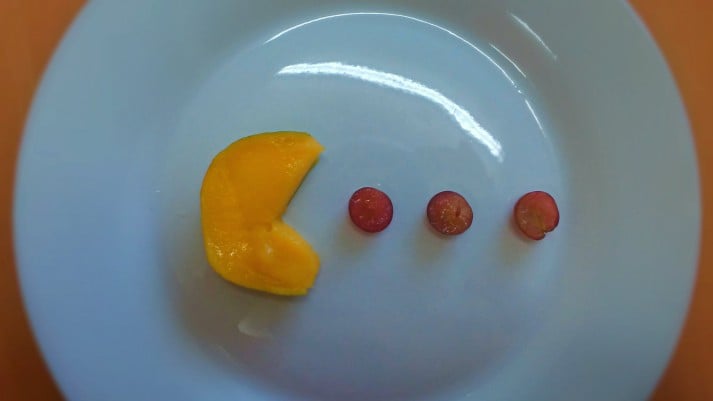Originally posted at: http://www.nerdfitness.com/
Steve here! I wanted to introduce Dan Schmidt, our newest contributor and wizard. Dan is a long-time Rebel and fatherhood specialist, and will be sharing his expertise in raising healthy and happy Rebels! Take it away Dan!
What have we always said is the most important thing? Breakfast. Family.
As parents who want the very best for our kids, we try to fuel their growing bodies with the best food possible. But as any parent of a toddler, pre-schooler, or even adolescent knows, our kids aren’t always on the same page.
The toddler years especially can be a challenging time for feeding. All of a sudden, a previously easy-going infant who ate anything, begins to reject the same foods being offered.
Don’t panic. This is a completely normal, albeit difficult, stage in your child’s development and we’re here to help you through it.
Let’s jump into looking at why children become fussy eaters, and examine some strategies you can implement today to lighten your load.
Why does this happen?
As a parenthood specialist, almost every parent I’ve met has asked me about issues in their child’s eating habits. The simple reason issues occur is that our toddlers are pulling a “power play.”
They’ve gained control!

Most things in their life are still controlled by their parents (what they wear, when they sleep, where they sit).
The one thing they have figured out, is that they can choose what to eat or spit out. (This change in behavior usually occurs between the ages of 12-18 months of development.)
Remember when you first discovered the Konami Code? You figured out a new way to beat the system, and likely tried it out whenever you could at first. That’s what our toddlers are doing – they’ve figured out something new, and by spitting out their vegetables, they’re telling their parents that they’ll do what they want.
If parents don’t manage this stage carefully (such as not always giving in to their child’s demands), these toddlers can grow up to become fussy eaters as older children.
So, what can I do about it?
Let’s put the master controller back in your hands with some simple strategies.
1) Eat together.
One of the simplest things you can do to encourage great eating habits in your child’s early years is to sit down together for family meals.
Studies and reports by the National Center on Addiction and Substance Abuse at Columbia University show that kids who eat at with their family regularly are at lower risk of developing poor eating habits, weight problems and even drug addiction compared to children who eat alone more often. When your kids regularly have a positive role model who is eating healthy thrust upon them, along with getting the benefits of feelings like belonging, stability and well-being, they are more likely to follow your lead and enjoy healthy mealtimes.
Sitting down to dinner together isn’t just about nutrition; it’s about connecting and teaching children about becoming members of society and acting in a civilized way.
2) Get rid of any distractions!

“Dad placed a great deal of importance on mealtime. He had a very strict rule. When the family starts to eat, the television is definitely turned down.”
(Super bonus points to anybody who knows where that quote is from without using Google or the Konami Code).
Seriously though, turn OFF the idiot box and put the handheld technology away (that means you too, mom and dad). Children get very easily distracted and overstimulated.
Practice “Mindful Eating.” By eliminating distractions, your child will be able to put more focus towards what’s on their plate. Studies have shown that practicing mindful eating helps keep people focused on their meal and listen to their body’s cues. However, feel free to play some light background music or light a candle at mealtime to promote a different, yet calm, environment.
3) Maintain consistent rules
It’s very important that parents of fussy eaters maintain clear and consistent food rules in the house at all times. Just like if Pac-Man touches a ghost without eating a power pellet, a life will be lost. Simple. And consistent (no exceptions!).
At mealtime, be sure to:
- Be clear and simple
- Encourage good behavior
- Know when to call it quits
- Be consistent
- ‘The Art of Manliness’ has an excellent post on “Why You Should Parent Like A Video Game,” which has many points that can be adapted for your family.
So if your child refuses a particular food that they have previously enjoyed, don’t be fooled; IT’S A TRAP! They’re hoping you’ll offer up something sweet as an alternative. If you do fall for this, your child will quickly learn that refusing vegetables results in something else being offered. So consistency is the key.
However, if your child continues to reject the meal, it is probably because they are simply not hungry. Toddlers have small stomachs and grow at a slower rate than babies, so it is completely normal for them to eat a lot one day, and very little the next. That leads me to…
DON’T use the force, Luke parents!
Whatever you do, don’t force them to eat, bribe them, or insist they finish everything on their plate. By doing this you’re risking creating a major issue around food, as well as generating a power struggle (spending willpower points) over something that’s really not worth it.
Remember, their stomachs are super small, so forcing overeating can cause detrimental physical and psychological effects regarding diet in their futures.
4) Presentation is everything.

Toddlers and children are very observant. Before they even start eating, their eyes are observing what has just been put in front of them. If it looks gross, they’re going to think it tastes gross.
So keep it colorful, neat and interesting. It literally takes an extra minute to re-arrange their food into a smiley face, or make the Triforce out of veggie sticks.
Just a little variation can sometimes make a world of difference. If your child dislikes fruit for example, try a range of cut fruits on a skewer.
Also, try preparing foods a different way. If your child hates steamed cauliflower, try mashed or roasted cauliflower. Steve has covered how to prepare vegetables differently in his ‘How to Start Eating Vegetables’ post, so give it a read and see what works for your family.
5) Make them your kick-ass kitchen sidekick.

Batman has Robin, Sonic has Tails, Radioactive Man has Fallout Boy, and most importantly, Super-Parent has Wonder-Kid!
Getting your child to help with meal preparation, no matter how little, will lead to them being more likely to eat the food as they now have an ‘ownership’ of the meal and feel proud about helping out.
At the store or market, ask your child to help you select fruits, vegetables, and other healthy foods. When you get back home, encourage your child to help you put the food away, arrange the fruit, or rinse the vegetables.
Be careful in what duty you assign your sidekicks though, once I put my daughter in charge of dispensing the soy sauce when I was making the Easiest Chicken Ever. As a result, it turned out to be the saltiest thing I had ever tasted (“and I once ate a big heaping bowl of salt!”).
Try to get everyone to help in some way before and after the meal. If the kids are not actually cooking, then there are other jobs the little tuckers can handle such as setting the table or getting everyone a drink.
6) Keep it fun and try a theme night!

Everyone loves a themed party, so why not put a bit of festivity into a regular night?
Try silly hat night, superhero night (my favorite), princess night (my daughter’s favorite), or talk like a pirate night (my wife’s least favorite). These are some simple, fun, and often hilarious ways of injecting some magic into family meal time, me hearties!
You don’t have to go all out like it’s Festivus every night, but some variation and a little excitement can make dinners a pleasure. Plus, you’re making amazing memories that your children will look back on so fondly.
If you do want to go that extra mile in creativity, try a color theme night to carry through everything (from place settings, the food, and even your clothes). For example, Green Night (not to be confused with its ante meridiem punk rock counterpart) is an excellent way to make those healthy vegetables seem fun, and a brilliant excuse to dress up as the Green Lantern.
Bringing your child’s interests to the dinner table is a good way of getting ideas for themes. My four-year-old loves learning about the different cultures, so selecting a cuisine from a particular country is an easy way to bring about discussion and try new foods.
But remember to keep it child-friendly. India night is a great idea in theory, but Beef Vindaloo is certainly not fit for a toddler, and we could have done without my culturally insensitive Apu Nahasapeemapetilon impersonation.
7) Change your scene.
Nobody likes playing the same level, or racing the same track all the time (particularly if it’s Rainbow Road, boy do I hate Rainbow Road). So moving away from the dinner table is an excellent way to add some excitement and adventure into mealtime.
Venturing into the great outdoors is a nice move if you have a nearby park, beach, or even backyard. I once worked with a father of two older children who would take their lunch geocaching with them. I can’t wait to do this when my kids get older with Pokémon Go (seriously, how awesome does that look?).
But if you can’t get outside for whatever reason (weather, time constraints, zombies, Australian wildlife), having a ‘picnic’ on a blanket in the living room is great fun too. Plus eating picnic-style means you can serve several small choices, like frittata fingers or vegetables and dips to create interest and let your little ones make their own decisions.
It’s not always easy, but it’s worth it.

I know that setting a theme, getting the kids outside, preparing a healthy meal with new foods all the time is simply not viable for everyone in today’s world.
My wife and I both work full time (and then some), so I’ll be the first to admit that some nights after a rough day, my kids have been served baked beans straight out of a can in front ‘The Wiggles’ on the TV.
But if we act when we can, we create positive memories of family mealtime and encourage good eating habits.
By putting the effort in up front, you’re actually making your lives easier for those hard days – laying a solid foundation and setting yourself up for success.
Don’t sweat it if you go through stages where it seems like absolutely nothing is working. Each child is different, and what works for one may not work for another.
Your child’s eating habits won’t change overnight, but the small steps you take each day can help promote a lifetime of healthy eating.
So go ahead and have some fun with your very next family meal. Try taking turns telling a story at tonight’s dinner table, or put a little effort into presenting your child’s breakfast tomorrow morning.
In fact, why don’t we just make it the Nerd Fitness Family Feast Challenge?
For the next month, we want you to try a few approaches:
- Set a goal on how many times you will all sit down together and stick to it. No excuses!
- Each week all family members (that’s right mom and dad, you’re not getting away that easily) must try a food that they have never eaten before.
- Each family member gets to suggest a theme night and all others must comply.
I’m in, my wife is in, my kids don’t know it yet, but they’re in too. Are you?
We’d love to hear from you:
What has worked for your fussy eaters in the past? Or, what has totally backfired?
What other questions do you have about your children’s eating habits?
What’s your little sidekick’s kitchen duty?
Leave a comment and let us know!
-Dan
About Dan: I’m Dan, a father of two amazing kids from Adelaide, South Australia. I am also a fatherhood specialist in a non profit organization, where I help other dads become the best they can be. I was introduced to Nerd Fitness five years ago by my brother-in-law when my wife was pregnant with our first child and I was really struggling with my weight. I knew I needed to get in shape so I could see my children grow up, and Nerd Fitness was exactly what I needed! Through diet and exercise, by the time my daughter had her first birthday I had lost 20 pounds.
I hope my articles can guide all Rebels, not just the parents, on your fitness quest. I’ll try to keep the dad jokes to a minimum (“Dead-lifts?” More like, “Dad-lifts!” Amirite?!)… I’ll show myself out.
Feel free to get in touch, either just to say G’day, or ask a question at any time.
###
Filed under: Fitness

 For now classes are 6pm and 640pm at 2840 Wildwood st in the Boise Cloggers studio.
Book your class NOW!
click this ==>
For now classes are 6pm and 640pm at 2840 Wildwood st in the Boise Cloggers studio.
Book your class NOW!
click this ==>








